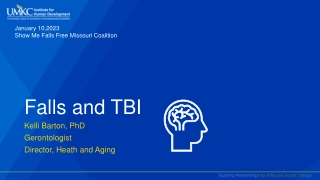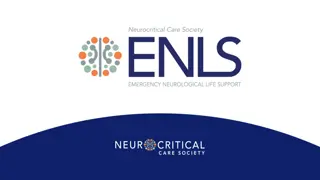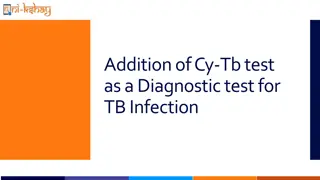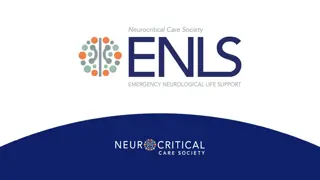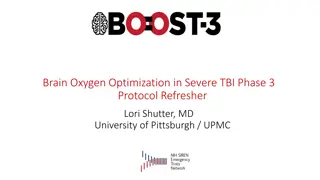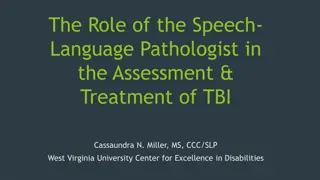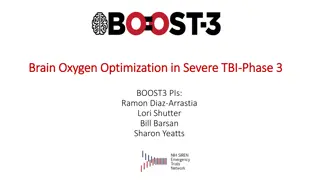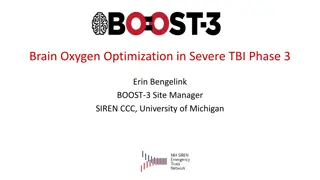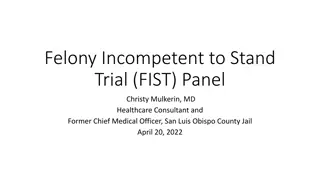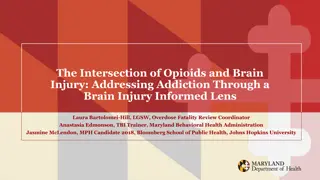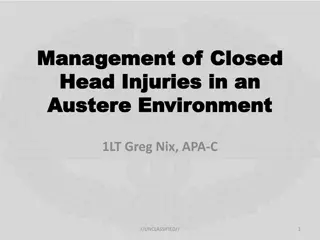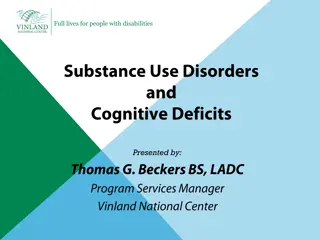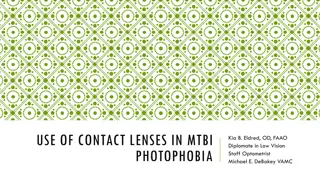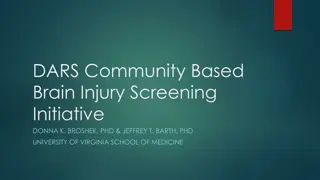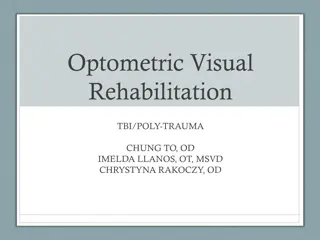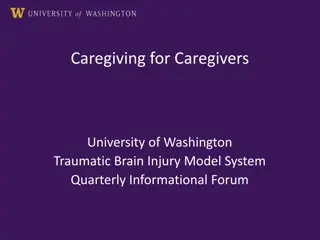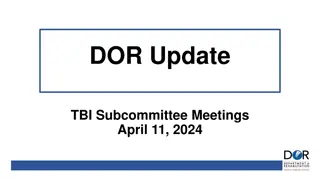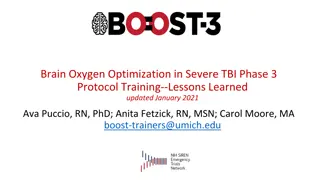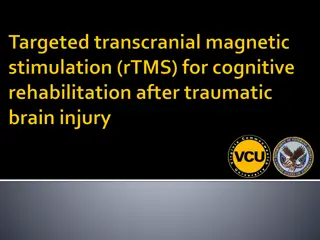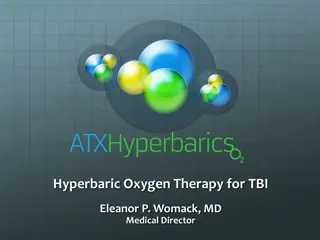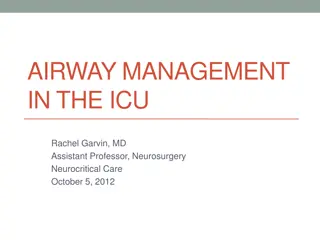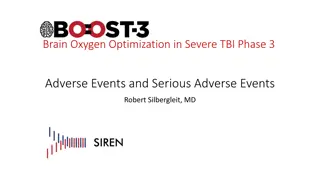Falls and TBI
January 10, 2023 Show Me Falls Free Missouri Coalition event to learn about TBI, falls, and aging. Presented by Kelli Barton, PhD, Gerontologist, Director of Health and Aging.
5 views • 15 slides
ENLS Version 5.0 Pharmacotherapy Pearls and Hyperosmolar Therapy Overview
This content delves into the pharmacotherapy pearls of ENLS Version 5.0, highlighting medication characteristics, adverse effects, and optimal pharmacotherapy strategies for acute neurological injuries. It specifically focuses on Hyperosmolar Therapy, comparing options like Mannitol and Sodium Chlor
1 views • 41 slides
Implementation of Cy-Tb Test for TB Diagnosis and Treatment Prioritization
In the 2023-24 program, a new test type called Cy-Tb has been introduced alongside TST and IGRA for diagnosing TB infection. This addition aims to facilitate the identification of individuals requiring preventive treatment, particularly in high-risk groups. By selecting "Diagnosis of TBI" as the rea
1 views • 11 slides
ENLS Version 5.0 Pharmacotherapy Pearls: Hyperosmolar Therapy Case Study
In this segment of ENLS Version 5.0 Pharmacotherapy Pearls, a case study is presented focusing on hyperosmolar therapy for intracranial pressure (ICP) control in a 25-year-old male with traumatic brain injury (TBI). The patient has received multiple doses of sodium chloride and mannitol within 24 ho
0 views • 41 slides
Connecting with People Today Through Handshakes, Fist Bumps, and High Fives
Discover fun and modern ways to connect with people in today's world through engaging gestures like handshakes, millennial fist bumps, and double high fives. Explore the power of human connection in various settings and enhance your social interactions with these simple yet impactful actions.
5 views • 23 slides
Brain Oxygen Optimization in Severe TBI - Protocol Summary
In the severe traumatic brain injury (TBI) protocol, intracranial monitors measuring ICP and PbtO2 are placed within 12 hours of injury. Procedures include FiO2 challenges to check PbtO2 reliability and assess cerebral physiology. Challenges involving FiO2, MAP, and CO2 help guide ventilator setting
2 views • 27 slides
Speech-Language Pathologist's Role in TBI Assessment & Treatment
Speech-language pathologists play a crucial role in assessing and treating traumatic brain injuries (TBI) which affect millions annually, with significant impact on children. SLPs collaborate with medical specialists, provide screenings, comprehensive evaluations, treatment development, and advocacy
0 views • 44 slides
Brain Oxygen Optimization in Severe Traumatic Brain Injury (BOOST3) Trials Overview
Overview of the BOOST3 trials focusing on brain oxygen optimization in severe traumatic brain injury patients. The trials involve multiple PIs, training sessions, and hands-on ancillary studies. Various design principles and organizational values are emphasized, with grant awards distributed to diff
0 views • 13 slides
Brain Oxygen Optimization in Severe TBI Phase 3: BOOST-3 Study Details at University of Michigan
Explore the BOOST-3 trial led by Erin Bengelink, focusing on brain oxygen optimization in severe Traumatic Brain Injury (TBI) Phase 3. Discover study materials, milestones, regulatory parameters, and training resources to facilitate your involvement in this crucial research project. Access the BOOST
1 views • 22 slides
Ensuring Mental Health Care in San Luis Obispo County Jail
Healthcare initiatives in San Luis Obispo County Jail aim to improve mental health services, focusing on FIST patients and reducing recidivism. Efforts include the Stepping Up Initiative, JBCT programs, and partnerships with DSH for support.
0 views • 9 slides
The Intersection of Opioids and Brain Injury: Addressing Addiction Through a Brain Injury Informed Lens
Exploring the correlation between traumatic brain injury (TBI) and the opioid crisis, this content delves into the alarming statistics of opioid overdoses and their impact on individuals with brain injuries. Highlighting the overlap and consequences of these two major health issues, it sheds light o
0 views • 45 slides
Management of Closed Head Injuries in an Austere Environment Overview
Understanding the pathophysiology of brain injuries, including intracranial pressure changes and specific injuries such as traumatic brain injury (TBI), skull fractures, brain bleeds, and diffuse axonal injuries. It covers classifications, diagnosis, and treatment approaches for mild/concussion, mod
0 views • 27 slides
Business Plan for Incubation at FIST-TBI, IIT Patna
Providing a comprehensive format for a business plan tailored for incubation at FIST-TBI, IIT Patna, focusing on mandatory sections, value proposition, and key considerations for potential applicants. The format aims to guide entrepreneurs in presenting their ideas and business concepts in a concise
0 views • 14 slides
Full Lives for People with Disabilities - Addressing Traumatic Brain Injury
Traumatic Brain Injury (TBI) presents a significant public health concern in the United States, often termed as the silent epidemic due to its hidden nature. This condition affects thinking and memory, impacting individuals' lives profoundly. Resources such as "The Essential Brain Injury Guide" shed
0 views • 23 slides
Physics Problems: Spacecraft Tether, Karate Fist Force, Sprinter Acceleration
The provided physics problems involve scenarios such as astronauts using a tether in space, calculating forces on a karate fist, analyzing a sprinter's acceleration, and determining forces to pull a car from mud using ropes. Solutions require applying Newton's laws of motion and understanding concep
0 views • 6 slides
Understanding the Use of Contact Lenses in Photophobia Associated with mTBI
Photophobia in patients with mild traumatic brain injury (mTBI) can be debilitating, with up to 59% of military personnel reporting sensitivity to light after a TBI event. Contact lenses, sunfilters, and tinted glasses can help manage photophobia symptoms. Mechanisms underlying photophobia involve t
0 views • 10 slides
Community-Based Brain Injury Screening Initiative at University of Virginia School of Medicine
Screening for traumatic brain injury (TBI) is crucial for identifying individuals with chronic TBI symptoms that impact productivity and social integration. The initiative aims to develop a brief, easy-to-administer TBI screening measure to assist community health organizations in identifying and re
0 views • 13 slides
Cognitive and Behavioral Management Strategies for Traumatic Brain Injury Patients
This presentation focuses on addressing challenging cognitive, behavioral, and personality issues associated with traumatic brain injury (TBI). It outlines cognitive issues such as attention, speed of processing, learning, memory, and executive functioning. Cognitive management strategies include te
0 views • 18 slides
Optometric Visual Rehabilitation for TBI/Poly-Trauma Patients: Principles and Considerations
Optometric Visual Rehabilitation involves the comprehensive treatment of visual system disorders, including binocular vision, accommodation issues, and more. Neural plasticity plays a key role in neuro-rehabilitation, allowing the brain to adapt and learn. The 10 principles of neural plasticity guid
0 views • 29 slides
Understanding Caregiving for Traumatic Brain Injury Survivors
Caregiving for individuals with Traumatic Brain Injury (TBI) is a crucial yet challenging role undertaken by family members or friends. The responsibilities can be overwhelming, impacting both the survivor and the caregiver's well-being. This presentation highlights the needs of caregivers, survivor
0 views • 22 slides
DOR Update and TBI Subcommittee Meetings - April 11, 2024
Department of Rehabilitation's latest updates include changes to its name, seeking feedback for a new name, staffing details, TBI State Partnership Program grants, and TBI Providers information. The TBI Subcommittee is enhancing services for survivors and caregivers to promote partnerships and infor
0 views • 17 slides
Lessons Learned in Brain Oxygen Optimization for Severe TBI Phase 3 Protocol
Screening, enrollment, and inclusion/exclusion criteria insights for the Brain Oxygen Optimization in Severe Traumatic Brain Injury (TBI) Phase 3 Protocol are discussed. Key points include handling urgent patient queries, guidelines on hypotension and hypoxia, pupil assessment considerations, and su
0 views • 20 slides
Principal Project Advisory Team Meeting - September 21, 2016
Key points discussed in the Principal Project Advisory Team meeting on September 21, 2016 included welcoming introductions, listing important issues anonymously, defining platform charge and success criteria, establishing meeting norms, utilizing the Fist to Five consensus process, and addressing ho
0 views • 15 slides
Cognitive Deficits and Treatment Options Following Traumatic Brain Injury
Traumatic Brain Injury (TBI) can lead to a range of cognitive deficits and long-term complications, affecting communication, sensory perception, behavior, and more. Severe TBI is associated with EEG frequency shifts and cognitive impairments similar to Alzheimer's disease and schizophrenia. While tr
0 views • 34 slides
Hyperbaric Oxygen Therapy for Traumatic Brain Injury (TBI) - Benefits and Mechanisms Explained
Hyperbaric Oxygen Therapy (HBOT) is a cutting-edge treatment that involves providing oxygen in a pressurized environment to enhance oxygenation of body tissues beyond what red blood cells can deliver. This therapy, administered under controlled conditions, offers various physiological and cellular b
0 views • 15 slides
Airway Management in the NeuroICU: Importance and Strategies
Understanding the crucial role of airway management in the NeuroICU is essential for preventing secondary brain injury and addressing respiratory complications in neurologically-injured patients. This presentation covers the significance of airways, common issues, evaluation techniques, adjuncts, an
0 views • 45 slides
Brain Oxygen Optimization in Severe TBI: Adverse Events Analysis
This study led by Dr. Robert Silbergleit focuses on adverse events in brain oxygen optimization for severe Traumatic Brain Injury (TBI) patients. It outlines key points for reporting adverse events, discusses relatedness algorithms, and presents scenarios to analyze adverse events occurrence post-en
0 views • 24 slides
